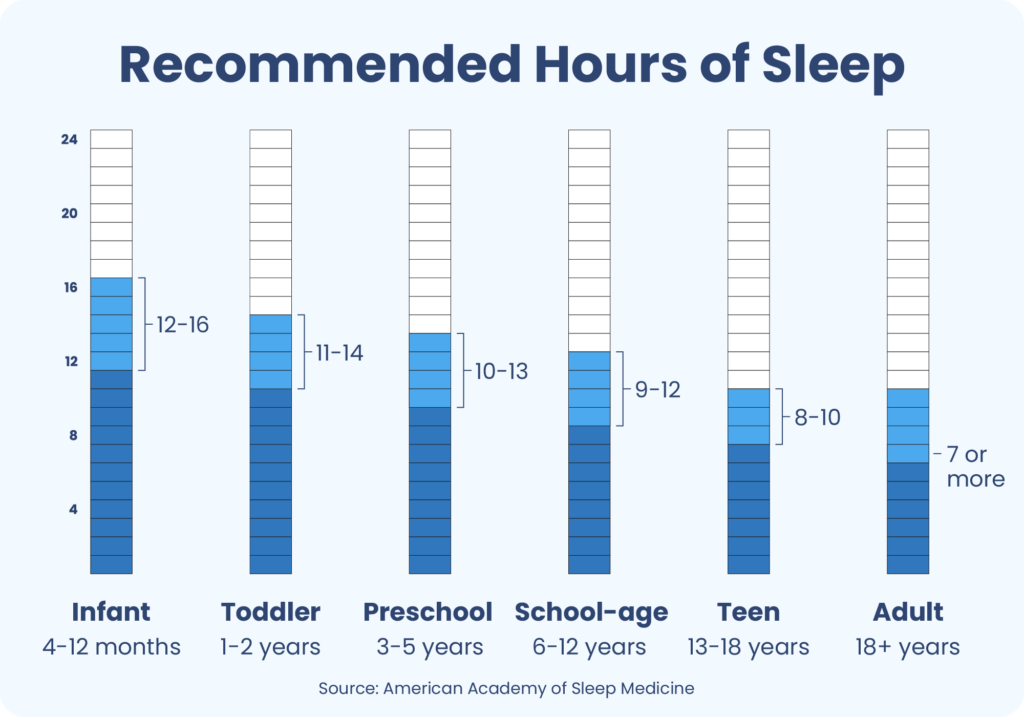When you buy through our links, we may earn a commission. Products or services may be offered by an affiliated entity. Learn more.
How Much Sleep Do You Need?
- Most healthy adults need at least seven hours of sleep each night.
- Infants, young children, and teenagers should get more sleep to support growth and development.
- Prioritize getting enough sleep each night to stay happy, healthy, and sharp.
Healthy adults need at least seven hours of sleep per night. Babies, young children, and teens need even more sleep to enable their growth and development.
Knowing the general recommendations for how much sleep you need is a first step. Next, it is important to reflect on your individual needs based on factors like your activity level and overall health. And finally, of course, it is necessary to apply healthy sleep tips so that you can actually get the full night’s sleep that is recommended.
Recommended Sleep Times By Age Group
| Age group | Age range | Recommended hours of sleep |
|---|---|---|
| Infant | 4-12 months | 12-16 hours (including naps) |
| Toddler | 1-2 years | 11-14 hours (including naps) |
| Preschool | 3-5 years | 10-13 hours (including naps) |
| School-age | 6-12 years | 9-12 hours |
| Teen | 13-18 years | 8-10 hours |
| Adult | 18 years and older | 7 hours or more |
Is Your Troubled Sleep a Health Risk?
A variety of issues can cause problems sleeping. Answer three questions to understand if it’s a concern you should worry about.
Different age groups need different amounts of sleep. In each group, the guidelines present a recommended range of nightly sleep duration for healthy individuals. In some cases, sleeping an hour more or less than the general range may be acceptable based on a person’s circumstances.
Sleep recommendations for newborns are not available because sleep needs in this age group vary widely and can range from as few as 11 hours to as many as 19 hours per 24-hour period.
How Much Sleep is Really Necessary?
These guidelines serve as a rule-of-thumb for how much sleep babies, children, and adults need while acknowledging that the ideal amount of sleep can vary from person to person. Some people need more or less sleep each night than those reflected in the ranges.

Deciding how much sleep you need means considering your overall health, daily activities, and typical sleep patterns. Some questions that you help assess your individual sleep needs include:
- Are you productive, healthy, and happy on seven hours of sleep? Or have you noticed that you require more hours of sleep to get into high gear?
- Do you have coexisting health issues that might require more rest?
- Do you have a high level of daily energy expenditure? Do you frequently play sports or work in a labor-intensive job?
- Do your daily activities require alertness to do them safely? Do you drive every day and/or operate heavy machinery? Do you ever feel sleepy when doing these activities?
- Are you experiencing or do you have a history of a sleep disorder?
- Do you depend on caffeine to get you through the day?
- When you have an open schedule, do you tend to sleep in more?
You can use your answers to these questions to hone in on your optimal amount of sleep.

How Were the Recommendations Created?
The American Academy of Sleep Medicine organized a panel of sleep experts to create these recommendations. The panel members reviewed hundreds of high-quality research studies about sleep duration and key health outcomes like cardiovascular disease, depression, pain, and diabetes.
After studying the evidence, the panel used several rounds of voting and discussion to narrow down the ranges for the amount of sleep needed at different ages. The final recommendations have been endorsed by other medical organizations, such as the Sleep Research Society, the American Academy of Pediatrics, and more.
Make Sleep a Priority
Once you have a nightly sleep goal based on the hours of sleep that you need, it is time to start planning for how to make that a reality.
Start by making sleep a priority in your schedule. This means budgeting for the hours you need so that work or social activities do not trade off with sleep. While cutting sleep short may be tempting in the moment, it does not pay off in the long run because sleep is essential for you to perform at your best, both mentally and physically.
Getting more sleep is a key part of the equation, but remember that it is not just about sleep quantity. Quality sleep matters too, and it is possible to get the hours that you need but not feel refreshed because your sleep is fragmented or non-restorative. Fortunately, improving your bedroom setting and sleep-related habits, is an established way to get better rest. Examples of improvements include:
- Improving your sleep hygiene, which includes sticking to the same sleep schedule every day, even on weekends
- Practicing a relaxing bedtime routine to make it easier to fall asleep quickly
- Choosing the best mattress that is supportive and comfortable, and outfitting it with the best pillows and bedding.
- Minimizing potential disruptions from light and sound while optimizing your bedroom temperature
- Disconnecting from electronic devices like mobile phones and laptops for a half-hour or more before bed
- Carefully monitoring your intake of caffeine and alcohol and avoiding consumption in the hours before bed
If you are a parent or caregiver, many of the same tips apply to help children and teens get the recommended amount of sleep. Teens in particular face a number of unique sleep challenges to getting the sleep they need.
If you or a family member are experiencing symptoms such as significant sleepiness during the day, insomnia, leg cramps, snoring, or another symptom that is preventing you from sleeping well, you should consult your primary care doctor or find a sleep professional to determine the underlying cause.
You can try using our sleep diary to track your sleep habits. This can provide insight about your sleep patterns and needs. It can also be helpful to bring with you to the doctor if you have ongoing sleep problems.

Still have questions? Ask our community!
Join our Sleep Care Community — a trusted hub of product specialists, sleep health professionals, and people just like you. Whether you’re searching for the perfect mattress or need expert sleep advice, we’ve got you covered. Get personalized guidance from the experts who know sleep best.
References
3 Sources
-
Paruthi, S., Brooks, L. J., D’Ambrosio, C., Hall, W. A., Kotagal, S., Lloyd, R. M., Malow, B. A., Maski, K., Nichols, C., Quan, S. F., Rosen, C. L., Troester, M. M., & Wise, M. S. (2016). Consensus statement of the American Academy of Sleep Medicine on the recommended amount of sleep for healthy children: Methodology and discussion. Journal of Clinical Sleep Medicine, 12(11), 1549–1561.
https://pubmed.ncbi.nlm.nih.gov/27707447/ -
Kirsch, D. (2022, September 12). Stages and architecture of normal sleep. In S. M. Harding (Ed.). UpToDate., Retrieved March 1, 2023, from
https://www.uptodate.com/contents/stages-and-architecture-of-normal-sleep -
Consensus Conference Panel, Watson, N. F., Badr, M. S., Belenky, G., Bliwise, D. L., Buxton, O. M., Buysse, D., Dinges, D. F., Gangwisch, J., Grandner, M. A., Kushida, C., Malhotra, R. K., Martin, J. L., Patel, S. R., Quan, S. F., Tasali, E., Non-Participating Observers, Twery, M., Croft, J. B., Maher, E., … Heald, J. L. (2015). Recommended amount of sleep for a healthy adult: A joint consensus statement of the American Academy of Sleep Medicine and Sleep Research Society. Journal of Clinical Sleep Medicine, 11(6), 591–592.
https://pubmed.ncbi.nlm.nih.gov/25979105/
















































